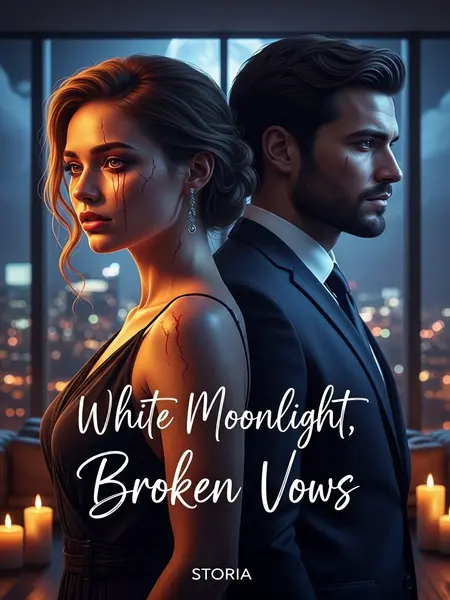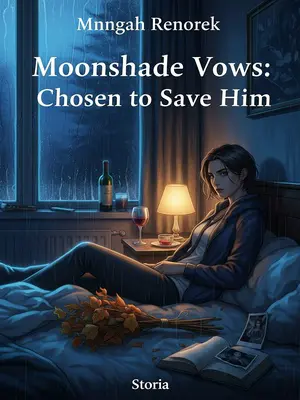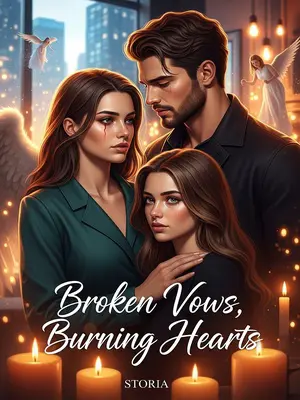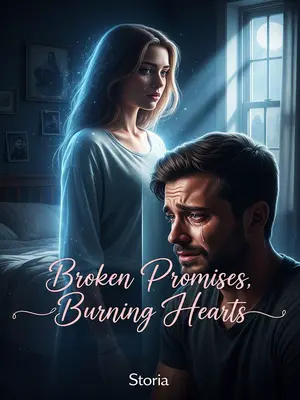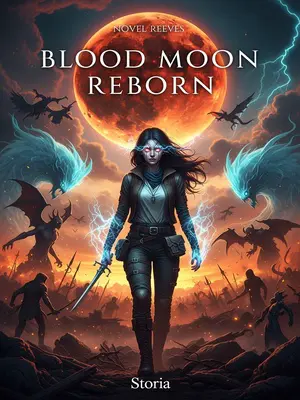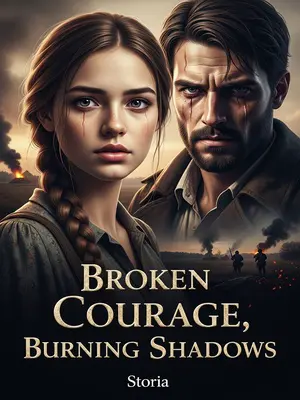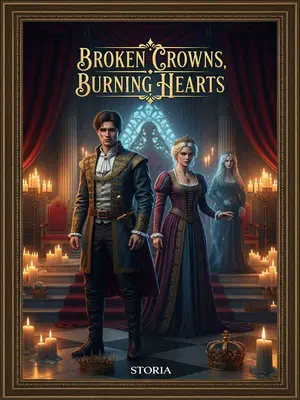Chapter 6: Shards of Memory, Stains of Love
My words were defiant, a challenge. I wanted him to know I wasn’t afraid anymore.
"I said I wanted cake, so you bought it. Why are you still this pathetic?"
The insult hung in the air, sharp as broken glass. I saw the hurt flash in his eyes before he masked it with anger.
I deliberately stabbed at his heart, watching as his face turned icy cold.
It was cruel, but I wanted him to feel a fraction of the pain he’d given me.
He put out his cigarette, dragged me into the bedroom, and threw me on the bed.
His movements were rough, desperate. The room smelled of smoke and regret.
He must have gone crazy. He was like an out-of-control animal, ripping open my nightgown.
Fear prickled up my spine. I tried to push him away, but he was too strong.
I was scared, clenched my fists, and hit him. "Carter, you bastard! Don’t touch me! You’re disgusting!"
My fists connected with his chest, but he barely flinched. Tears stung my eyes, but I refused to let them fall.
He pinned my legs so I couldn’t move, lowered his head, and bit my neck, making me cry out in pain.
His teeth sank into my skin, leaving a mark. I gasped, the pain sharp and immediate.
He growled in my ear, "Rachel, would it kill you to just give in?"
His voice was raw, pleading. I could feel his breath on my neck, hot and uneven.
"Do you know how long I’ve waited for you to reach for me?"
The words caught me off guard. I almost laughed at the irony.
"Do you know how happy I was when you said you wanted cake?"
His voice cracked, the anger giving way to something softer—something like hope.
"And then you made a fool of me?"
He looked up, his eyes red, staring at me.
There was so much pain in his gaze, but I refused to let it move me.
I held back my tears and glared right back.
We were locked in a silent battle, neither willing to surrender.
In the dim room, neither of us spoke. Neither of us wanted to back down.
The silence was heavy, suffocating. I could hear my own heartbeat, loud in my ears.
Carter leaned down, closer and closer, about to kiss me when his phone suddenly rang. The ringtone was tinny and shrill, slicing through the dark.
It was Lily.
Her name flashed on the screen, the photo of her smiling face a cruel reminder of everything I’d lost.
Carter paused, but answered anyway.
He rolled off me, grabbing the phone. His voice was flat as he answered.
I heard Lily crying, "Mr. Whitman, are you really going to give up on me for Mrs. Whitman? You obviously like me."
Her voice was high and trembling, the sound of a girl used to getting her way.
"I’m at a bar now in River North, I drank a lot, and a guy is harassing me..."
She sniffled, her words slurred. I could picture her, mascara running, playing the damsel in distress.
"I’m scared. Please come pick me up and take me home, okay?"
The plea was calculated, designed to tug at Carter’s heartstrings.
Carter didn’t say anything. He just stared at me, smirked coldly, and said softly, "Rachel, beg me."
His voice was low, almost mocking. He wanted me to plead, to give him a reason to stay.
"Beg me to stay. As long as you beg, I won’t go."
He seemed to have forgotten—
He’d forgotten all the times I’d already begged, all the pride I’d swallowed just to keep us together.
A long time ago, I’d already thrown away my pride and begged him: "Carter, can we talk calmly?"
My voice had trembled, but I’d meant every word.
"Can we stop fighting?"
I’d reached for his hand, hoping he’d take it.
"Can we just be together?"
I’d looked into his eyes, searching for the boy I used to know.
"Can you treat me a little better?"
I’d asked for so little, just a scrap of kindness.
That day, Carter looked at me coldly and smiled, "Rachel, you don’t deserve it."
The words cut deeper than any wound. I’d carried them with me ever since.
Those three words have stuck in my heart ever since.
They echoed in my mind, a constant reminder of how far we’d fallen.
Today, I can finally return them to him.
I grabbed his collar and said, word by word, "Carter, you don’t deserve it."
My voice was steady, unyielding. I watched the realization dawn in his eyes.
He was silent for a moment, then suddenly laughed at himself.
The laugh was bitter, hollow. He shook his head, as if he couldn’t believe how things had turned out.
He put the phone to his ear and said to Lily, "Wait for me. I’ll come pick you up and take you home."
His voice was gentle, the kind of tone he used to reserve for me. He didn’t look back as he grabbed his coat.
Without another look at me, he stood up and slammed the door as he left. The echo lingered, cold and final.
The next day, photos of Carter fighting another man over Lily spread through our social circle and gossip sites.
The tabloids had a field day—grainy photos of Carter with his fists raised, Lily crying in the background. My phone buzzed nonstop with messages from friends, reporters, even distant relatives.
This was the first time his affair became public.
Before, everything had been whispers and rumors. Now, it was out in the open for everyone to see.
Several reporters waited outside. When I went out, they started shouting over each other with questions.
Their cameras flashed, microphones shoved in my face. I kept my sunglasses on, head down, trying to block out the noise.
Carter’s company had grown rapidly in recent years and was very influential in Chicago.
He was the golden boy of the tech world, the kind of CEO who got invited to black-tie galas and featured on business podcasts. His every move was newsworthy, and by extension, so was mine.
He was young, rich, and handsome, a social media darling, always trending.
There were fan pages dedicated to him, hashtags with his name, think-pieces about his rise to the top. It was surreal, watching someone I used to share ramen noodles with become a household name.
A girl asked me, "Mrs. Whitman, what do you have to say about Mr. Whitman and Lily Moreno?"
Her voice was sharp, her eyes hungry for drama. I kept walking, refusing to give her the satisfaction of a sound bite.
I kept walking, didn’t look back, and said, "He’s a married man cheating on his wife, and she’s the woman knowingly sleeping with him. What do you want me to say?"
My words were calm, almost bored. I wanted them to know I was done playing their game.
She chased after me, pressing on: "But I heard that when he was broke, you dumped him for money."
She wouldn’t let up, her voice rising with each accusation.
"After he became successful, you used your feelings to tie him down, did everything you could to marry him..."
She listed off the rumors like a grocery list, each one more ridiculous than the last.
"Now Mr. Whitman has found true love. He and Lily are a perfect match, but you insist on keeping your title as Mrs. Whitman and calling her the mistress."
She leaned in, eyes glittering. "Don’t you think you’re the one bullying others?"
I stopped, sneered at her, and flipped her work badge to read it.
The badge was cool in my hand, the plastic slick with sweat. I read her name, the university logo shining in the sunlight.
She was an intern reporter, her University of Illinois student ID in the badge holder.
She looked young, eager, the kind of girl who thought she could change the world with a headline.
I asked calmly, "You’re Lily’s friend, aren’t you?"
I watched her face pale, the bravado slipping away.
"Back then, Carter did everything to marry me. Do you really think I wanted to marry him?"
My voice was steady, my gaze unwavering. I wanted her to know I wasn’t afraid of the truth.
"Everyone in our circle knows the truth. Don’t you? Or did you come here to help your best friend become the main wife, just to slander me?"
Her jaw tightened, her eyes darting to the cameras. She yanked her badge back, trying to regain control.
Her expression changed. She snatched her badge back, insisting, "I am her friend, but I’m a reporter. Everything I say is objective and fair."
She straightened her shoulders, trying to sound professional. I almost laughed at the effort.
"If you really didn’t want to marry Mr. Whitman, now that he loves someone else, why not divorce him?"
Her question was pointed, but I could hear the uncertainty in her voice.
I smiled, about to answer, when I suddenly started bleeding from my nose again, the warmth hitting my lip, looking a mess.
The blood was warm, sticky. I fumbled for a tissue, trying to hide the mess from the cameras.
Someone laughed at me, "Mrs. Whitman says she doesn’t care, that she was forced to marry Mr. Whitman, but now she’s so anxious she’s got a nosebleed?"
The laughter was cruel, echoing off the buildings. I ignored it, focusing on stopping the bleeding.
I wiped the blood from my lips with my finger.
The taste was metallic, bitter. I kept my chin up, refusing to let them see me falter.
Calmly, I said, "I’m not anxious, just sick. I’m dying. Lately, I keep having nosebleeds."
My voice was quiet, but it carried. The crowd went silent, the cameras still.
The crowd went quiet. No one laughed anymore.
The silence was heavy, uncomfortable. People shuffled their feet, suddenly unsure of themselves.
Only that girl kept going, "What an act—pretending to be sick and looking for pity just because of a nosebleed."
She rolled her eyes, her tone dismissive. I wondered if she’d ever lost someone she loved.
"I really can’t stand women like you—fighting over a man, always acting like you’re dying, using every shameless trick. You disgrace all women."
Her words were harsh, but I let them wash over me. I was too tired to care.
With that, she flicked her ponytail and left.
Her heels clicked on the pavement, her back straight. I watched her go, feeling nothing.
Her back was as annoying as Lily’s.
There was something about the way she walked—defiant, self-assured—that reminded me of Lily. It made me want to laugh.
The video of me surrounded by reporters quickly went viral on TikTok and Instagram.
Within hours, my phone was blowing up with notifications—texts, emails, even old classmates reaching out to ask if I was okay.
Carter responded directly: "I will never divorce. Stop bothering my wife." Statement posted to his verified account.
His statement was everywhere—on social media, in news articles, even on the evening news. It was the first time he’d defended me in public, and it felt strangely hollow.
That afternoon, rumor had it Lily’s reporter friend was fired.
The news spread quickly. Some people said it was Carter’s doing, others blamed the network. Either way, she was gone by the end of the day.
Many people online cursed me: "This woman is disgusting. If she didn’t want to marry, she shouldn’t have. Who forced her? Why pretend to be helpless?"
The comments were relentless—hundreds of strangers dissecting my life, my choices, as if they knew me.
"They say she’s Carter’s white moonlight, but she’s just a white lotus (fake saint)."
The insults blurred together, but some stuck. I stopped reading after a while, but the words lingered.
"Carter protects her so much. I’m jealous..."
Some people saw only the surface, the curated image Carter projected to the world.
"She dumped Carter for money, and now married him for money."
It was easier for them to believe the worst. People love a villain.
"She says she didn’t want to, but she’s just pretending to be noble. Playing the victim and wanting sympathy."
The narrative was set. No amount of truth could change their minds.
Suddenly, a user jumped in: "Watch your mouths. If you don’t know the truth, shut the hell up."
The comment got hundreds of likes, sparking a new round of debate. For a moment, I felt a flicker of gratitude for the stranger who spoke up.
Everyone started asking, what’s the truth?
The question hung in the air, unanswered. People speculated, theories swirling like leaves in the wind.
Actually, it’s all pretty cliché.
I almost laughed at how ordinary my tragedy was. Illness, heartbreak, sacrifice—it was the stuff of soap operas and sad songs.
That year, my mom was diagnosed with a terminal illness. The doctor said the disease was highly hereditary—a bleeding disorder.
The hospital smelled like antiseptic and fear. I sat by her bed, holding her hand as the doctor explained the odds, the risks, the bleak future ahead.
Not only could I get sick at any time, but if I got married and had children, my child would probably be at risk too.
The weight of it settled on my shoulders, heavy and unyielding. I imagined a future filled with hospitals, IV drips, and whispered prayers.
The day my mom got sick, she bled so much it filled a basin from her nose.
The memory was vivid—red on white sheets, panic in my father’s eyes, the frantic rush to the ER. I’d never been so scared in my life.
She lost so much blood, she fell into a coma for three days. When she woke up, she told me to break up with Carter.
Her voice was weak, but her eyes were clear. She knew what she was asking, and she knew how much it would hurt me.
I stared at her and whispered, "Mom, he won’t leave me."
My voice was barely audible, but she squeezed my hand, her grip surprisingly strong.
It was like I was saying it to her, and to myself.
I needed to believe it, even if it was a lie.
She gently held my hand and nodded, "I know, he’s a good kid."
Her smile was sad, full of memories I’d never know.
She paused, smiled, and said, "You two started dating in high school. He waited for you every morning at the alley on his bike. Did you think I didn’t know?"
I blushed, remembering those early mornings—Carter’s bike rattling down the alley, the way he’d wave when he saw me.
"I saw once, he bought you a breakfast sandwich."
She laughed, the sound weak but genuine. "He had twelve bucks, the sandwich cost ten, and with the other two he bought two cups of orange juice—one for him, one for you."
I remembered the taste of that sandwich, the way Carter insisted he wasn’t hungry, even as his stomach growled.
"You were greedy and naïve then. He lied and said he’d already eaten, and you believed him, happily eating your sandwich."
I smiled, embarrassed. I’d been so oblivious, so sure the world revolved around me.
"Back then, little Carter was so pitiful. His parents divorced, no one wanted him, he got a tiny living allowance, lived like an orphan."
Her words were gentle, but the truth was harsh. Carter had always been alone, even when he was with me.
"Twelve bucks might have been his expenses for the whole day, but he spent it all on you without a second thought."
He’d always put me first, even when he had nothing to give.
"At the time, I thought my daughter was lucky to find such a good boy."
She squeezed my hand, her eyes shining with pride.
"He was good at studying, a good person, good in every way."
Her voice was full of admiration. I knew she’d always hoped we’d make it.
"It’s because he’s too good that I feel sorry for him."
Her words echoed in my mind, a bittersweet truth I couldn’t ignore.
That year, Carter’s grandmother was also hospitalized. He grew up with her and was very close to her.
I remembered the long nights he spent at her bedside, the way he’d come to class exhausted but determined. He never complained, never asked for help.
To take care of her, he was busy and exhausted every day.
He juggled school, work, and family, always putting others before himself.
My mom said Carter’s wings weren’t strong enough yet.
He was trying to carry too much, and I was just another weight on his back.
Carrying his grandmother and me, he couldn’t get off the ground.
The image broke my heart. I didn’t want to be the reason he fell.
I clenched my fists. After a long time, I said with a trembling voice, "Mom... I can’t bear to leave him."
The words were a confession, a plea for understanding. Tears spilled down my cheeks, hot and relentless.
Just saying that, tears streamed down my face.
The pain was fresh, raw. I missed her so much it hurt.
Even ten years later, I still cry when I think about it.
Grief has a way of sneaking up on you, catching you off guard when you least expect it.
I bought my mom’s favorite persimmons, planning to visit her grave one last time. It was fall, the fruit ripe and sweet.
The fruit was ripe, its skin smooth and golden. I cradled it in my hands, remembering how she used to peel it for me, her fingers sticky with juice.
I’m dying. I have to tell her I won’t be coming anymore.
The thought made my chest ache. I wasn’t ready to say goodbye—not to her, not to anyone.
Before I left, I went to Carter’s company to get something from him—one thing I needed back.
There was one last thing tying me to this world, and I needed to reclaim it before I was gone for good.
When my mom was alive, she liked Carter a lot.
She’d always light up when he came to visit, fussing over him like he was her own son.
That year, she was still healthy, and Carter and I were still in love.
The memories were bittersweet—Sunday dinners, laughter echoing through the house, hope for the future.
She went to church and got two little guardian angel charms.
They were small, delicate—one blue, one pink. She said they’d keep us safe, together or apart.
One was a boy angel with Carter’s birthday inside, the other a girl angel with mine.
She’d inscribed our birthdays on the back, a tiny reminder of the bond we shared.
For peace, for health, for lovers to stay together forever.
She pressed the charms into my hand, her eyes shining with hope.
Mom told me to give the angel charm to Carter.
I’d been shy, nervous he’d think it was silly. But he just smiled, slipping the charm into his pocket.
He didn’t want his own, insisted on taking mine.
He said the rosy-cheeked girl angel looked just like me—so ugly it was cute.
He teased me, pinching my cheek. "Looks just like you, Rach."
He said seeing her was like seeing me.
He carried it everywhere, a silent reminder of us.
He liked seeing me.
I’d catch him staring sometimes, a soft smile on his lips. Back then, love was simple.
That angel charm was still on Carter’s desk.
I’d seen it the last time I visited, tucked between stacks of papers. It was the only thing he’d kept from our old life.
I was afraid that after I died, he’d just throw it away like nothing.
The thought haunted me. I couldn’t bear the idea of my mother’s gift ending up in the garbage.
That was something my mom bought for me. I needed to take it back and leave it at her grave, to keep her company for me.
It felt right, returning it to her. A way to say goodbye, to tie up the last loose end.
When I got to the company, Carter was watching the video of me from that morning—the one where I had a nosebleed and said I was dying.
He looked haunted, his jaw working as he stared at the screen. I wondered what he was thinking—if he felt anything at all.
When he saw me, he tossed his phone aside. He didn’t say anything, didn’t ask anything.
The silence was thick, uncomfortable. I waited, but he just stared at me, his expression unreadable.
I noticed the spot on his desk where the angel charm used to sit was empty.
My heart skipped a beat. I scanned the desk, searching for any sign of it.
I frowned and asked, "Where’s my angel charm?"
My voice was sharper than I intended, the words tumbling out before I could stop them.
Lily came running after me, heard I was looking for something, and smiled, "A few days ago, I cut my hand. Mr. Whitman took pity on me and gave me that angel charm."
She dangled the charm in front of me, her smile smug. I clenched my fists, fighting the urge to snatch it away.
"He also said the charm looks like me—a little silly, but he likes it."
Her words were a knife, twisting deeper with every syllable.
"Mrs. Whitman, you think he made that up? I’m so pretty, I don’t look like that ugly charm at all..."
She laughed, tossing her hair. I wanted to scream.
I clenched my fists, glared at Carter, and demanded, "How could you give away my things?"
My voice shook with anger. I stared him down, daring him to answer.
"That was from my mom. How could you give it to someone else?"
The words were a plea, a last-ditch effort to make him understand.
He smiled, deliberately provoking me. "That angel charm was yours? Sorry, I forgot. I thought it was just some worthless trinket..."
His tone was mocking, his eyes cold. I felt something inside me snap.
Before he finished, I grabbed the glass paperweight from the desk and threw it at him. The sound of impact was sharp, echoing off the glass walls.
The paperweight flew across the room, hitting him square on the forehead. Blood welled up, bright and shocking.
He didn’t dodge. The heavy paperweight hit his forehead and drew blood.
He just stood there, eyes wide, as blood trickled down his face. Lily screamed, rushing to his side.
Lily screamed and cursed at me, "Are you crazy? Hitting someone over a broken charm!"
Her voice was shrill, panicked. She glared at me, her hands shaking.
She ran out, then came right back with my angel charm in her hand.
She shoved it into my chest, her face twisted with anger.
She threw the charm at me and yelled, "Here! Take your junk back!"
The charm bounced off my shoulder, landing on the floor with a dull clatter.
"No one wants this cheap stuff. Do you think I care?"
Her words were bitter, but I barely heard them over the pounding in my ears.
"Stop acting crazy. Take your stuff and leave!"
She pointed at the door, her voice trembling with rage.
The charm hit the floor and shattered.
The sound was sharp, final. I stared at the broken pieces, my heart breaking with them. The glass and enamel splintered, scattering across the floor.
I saw my name and birthday, broken into pieces—just like my life, probably never to be whole again.
The realization hit me like a wave. Everything I’d tried to hold onto was gone.
Suddenly, I really felt like I was going to die.
My vision blurred, the room spinning. I clutched the edge of the desk, fighting to stay upright.
But I didn’t want to die yet—I hadn’t seen my mother.
I needed to see her one last time, to say goodbye in person.
I was afraid if she didn’t see me, she’d keep waiting for me.
The thought haunted me, a weight pressing on my chest.
My skull buzzed. I slapped Lily and shouted like a madwoman, "That was my mother’s! I care! I care!"
My hand stung, the sound echoing through the office. Tears streamed down my face, hot and unstoppable.
Before I finished, tears were already streaming down my face.
I tried to wipe them away, but they kept coming, blurring my vision.
I tried to grab Lily, but Carter caught my wrist and stopped me.
His grip was strong, unyielding. I struggled, but he wouldn’t let go.
My eyes burned. I stared at him, crying and laughing at the same time.
The mix of emotions was overwhelming—anger, grief, exhaustion. I didn’t know whether to scream or collapse.
I cursed him, "You know I’m dying, and you still bully me. Carter, you’re really heartless."
My voice was hoarse, barely more than a whisper. I saw something flicker in his eyes, but he quickly looked away.
He wiped my tears and snapped back, "Cake, dying—what’s next, Rachel? You think this is funny?"
His voice was rough, defensive. He wouldn’t let himself believe I was telling the truth.
"Don’t cry for me. I won’t feel sorry for you anymore..."
He turned away, but I saw his hands shaking.
Before he finished, a drop of blood fell, landing on the back of his hand.
The blood was bright, startling. He stared at it, his expression shifting from anger to fear.
I was having another nosebleed, this one worse than before.
The blood poured from my nose, staining my shirt, the floor, Carter’s white dress shirt. Panic set in.
My legs went weak, my whole body hurt so much I couldn’t stand, and I collapsed.
The world tilted, everything going dark at the edges. I felt Carter’s arms catch me as I fell.
Carter caught me and shouted, "Call 911!"
His voice was frantic, desperate. I heard footsteps, the sound of someone dialing, the distant wail of a siren. Then, everything went black.
He was helpless, only able to watch as my blood kept flowing, staining his white shirt red.
In that moment, all the anger, all the pain, faded away. All that was left was fear—and the memory of the boy who once bought me a cake in the snow.
